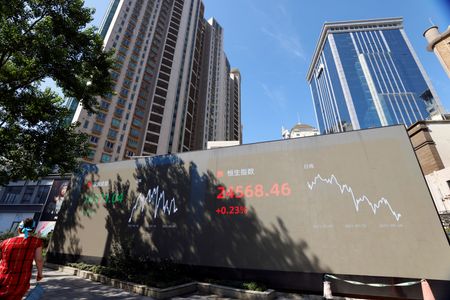By Alden Bentley and Elizabeth Howcroft
NEW YORK/LONDON (Reuters) -Profit-taking capped global stock markets on Friday after a week of record-setting advances fueled by a series of dovish central bank signals, while the dollar struggled to extend a gain as U.S. yields ticked lower.
The S&P 500, Nasdaq and Dow sought direction from the open, with the benchmark S&P closing near flat even as it posted its biggest weekly gain of 2024. The MSCI World Equity Index fell 0.26%, but went up 1.8% since late last Friday, its biggest weekly gain this year.
“It’s been a busy week and it’s one of those Fridays where it just feels like every participant is tired. There’s no huge news to drive anything one way or the other, so you’re seeing a market that’s hovering around the unchanged line,” said JJ Kinahan, CEO of IG North America and president of Tastytrade in Chicago.
A surprise rate cut by Switzerland’s central bank on Thursday helped push markets to new highs, as traders realized that major central banks around the world would not necessarily wait for U.S. Federal Reserve rate cuts before delivering their own.
Traders also drew confidence from the Bank of England being more dovish than expected, saying the economy is “moving in the right direction” for it to start cutting rates.
On Wednesday, the Federal Reserve left the fed funds rate alone at 5.25% to 5.50% but indicated it was still prepared to lower rates by 75 basis points this year, despite a worrying uptick in U.S. inflation and economic growth solid enough to maybe even dodge a soft landing.
It said that recent high inflation readings had not changed the underlying story of slowly easing price pressures.
The S&P 500 on Friday fell 0.14%, to 5,234.18, the Dow fell 0.77% and the Nasdaq Composite gained 0.16%, to 16,428.82. For the week they rallied 2.3%, 2.0% and 2.9%, respectively.
Europe’s STOXX 600 fell 0.03%, after touching a new all-time high, while London’s FTSE 100 rose 0.6%, helped by expectations that the Bank Of England would cut rates sooner than previously thought. BoE Governor Andrew Bailey told the Financial Times that the expectation of more interest rate cuts this year on a whole was not “unreasonable”.
“I think there might be some profit-taking at the end of the week, just because of the amount of data that we’ve seen and the fact that we have seen more positive surprises,” said Baylee Wakefield, multi-asset fund manager at Aviva.
Trading may also subside in the lead-up to Easter next weekend, Wakefield added.
“The dollar’s basically going to have its best week since January and that is because markets are now accepting that other major central banks will reduce their policy rate faster than the Fed, especially because we’ve had further evidence from the strong economic data we’ve had out of the U.S. this week,” Wakefield said.
The dollar index gained 0.4%, on track for its best week since the first week of the year, with the euro down 0.5% at $1.0807. The probability of a European Central Bank rate cut before summer is increasing, Bundesbank President Joachim Nagel said.
Kinahan said the lack of a definitive date from the Fed for when they might ease was dollar supportive. “I think with that you may be able to see dollar hold on a little bit longer than people would expect, with expected rate cuts.”
The British pound weakened 0.5% to $1.26, having earlier hit a one-month low.
The yield on benchmark U.S. 10-year notes fell 6.7 basis points on Friday to 4.204%, while the 2-year note yield, which typically moves in step with interest rate expectations, fell 3.9 basis points to 4.5934%.
Euro zone government bond yields were set for a weekly decline. The benchmark German 10-year yield was down by about 11 basis points at 2.327%.
China’s yuan dropped sharply during Asian trading, hitting a four-month low, in a move analysts attributed to rising expectations that there will be more monetary easing to prop up the country’s economy. The offshore yuan was priced at 7.2759 per dollar in late U.S. trade.
The sudden move knocked the Shanghai Composite index down 0.95%. MSCI’s broadest index of Asia-Pacific shares outside Japan fell 1.1%, while Japan’s Nikkei rose 0.18% to a record-high close.
U.S. crude futures settled down 0.54% at $80.63 a barrel and Brent futures fell 0.41% to $85.43 per barrel. The possibility of a ceasefire in Gaza weighed on prices, along with the stronger dollar and lower U.S. gasoline demand.
Spot gold fell 0.73% to $2,164.96 an ounce, but was near a record bid high set on Thursday. U.S. gold futures fell 0.83% to $2,164.20 an ounce.
Investment flows into gold in the week to Wednesday reached their highest in almost a year, Bank of America Global Research said.
In cryptocurrencies, bitcoin fell 2.82% to $63,620.00. Ethereum declined 4.74% to $3318.2.
(Reporting by Alden Bentley in New York and Elizabeth Howcroft in London: Editing by William Maclean, David Evans, Nick Macfie and Daniel Wallis)




